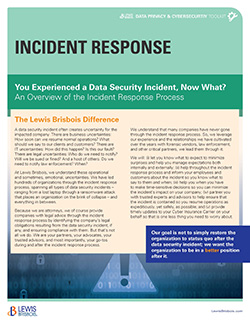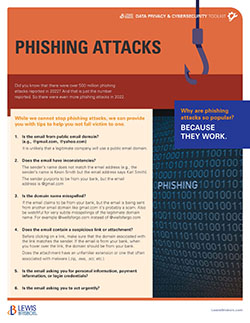Data Privacy & Cybersecurity
Lewis Brisbois offers clients one-stop end-to-end legal solutions for data privacy and cybersecurity matters, including data privacy compliance, pre-incident cyber risk management, breach response, and defense of third-party claims and class actions arising out of data breach incidents. Our national Data Privacy & Cybersecurity Practice has deep experience handling sophisticated cyber- attacks and events that can compromise highly sensitive personal information. We handle cross-border data breaches, often through our alliance with firms around the world. In addition, our team draws on the talent of our 1,600+ attorneys in 55 strategically located offices to defend complex class actions arising out of data breaches and privacy violations. We also provide data privacy compliance services to ensure that companies are in alignment with state, federal and international privacy laws and regulations.
Chairs
Vice Chairs
Related Attorneys
Related News, Publications & Events
Data Privacy Compliance Services
Our data privacy compliance team is experienced in implementing and refining comprehensive data privacy programs for companies of varying sizes and industries with an eye toward helping implement a privacy by design mindset into the fabric of their organizations. We also have deep expertise in technology transactions, as well as readying clients’ privacy posture to best position for highest value in mergers and acquisitions.
|
Jurisdiction Specific Expertise |
Industry Specific Expertise |
Data Privacy Services |
|---|---|---|
|
We assist clients across numerous industries in developing their privacy programs in compliance with various international, federal and state privacy laws, including:
More to come… |
We also have extensive industry experience, including in various highly-regulated industries such as: Banking and financial services
Education
Hospitals and medical practices
|
We provide various services to our clients to enable their compliance with the applicable privacy regimes, including:
|
Cybersecurity Services
|
Pre-Incident Response Services |
Incident Response Services |
Post-Incident Response Services |
|---|---|---|
|
We offer a full compliment of pre-incident response services, including:
|
We assist impacted organizations with the following incident response services:
|
Responding to government investigations by regulators, including:
Civil litigation defense, including:
|



- Artificial Intelligence Task Force
Related Practices
Latest Data Privacy & Cybersecurity Posts
- December 06, 2022 Just In Time: Last Minute Compliance Tips for the CPRA and VCDPA
- October 18, 2022 White House Issues Executive Order on EU-U.S. Data Privacy Framework
- September 29, 2022 California Legislature Takes Steps to Regulate Collection and Storage of Children’s Data










































